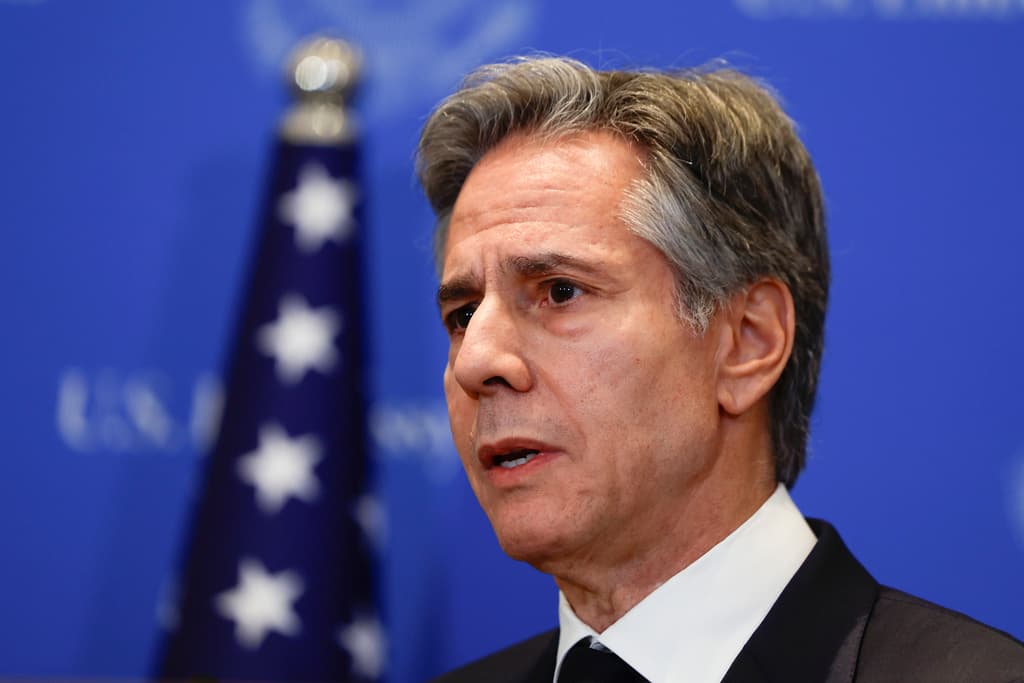Washington’s Unrealistic Premises on Post-Gaza War Blinker Blinken’s Vision
The American secretary of state says the West Bank and Gaza ‘should be united under Palestinian-led governance’ after the war. Many Israelis see that as an unrealistic scenario under the current circumstances.

Secretary Blinken, in the next to last stop of his whirlwind Mideast tour, is promoting an “integration of the region.” Yet, his efforts are being hampered by an underlying problem: Washington’s many unrealistic post-Gaza war premises.
“Many countries in the region are really prepared to invest in a number of ways, to invest, when the conflict in Gaza is over, in its reconstruction, in its security,” Mr. Blinken told a press conference at Tel Aviv Tuesday. Yet, he added, “it is essential to them that there’ll also be a clear pathway to the realization of Palestinian rights and a Palestinian state.”
Countries uninvolved in the Hamas conflict are on the verge of cutting relations with Israel over alleged war crimes at Gaza. South Africa has taken the Jewish state to the Hague, alleging it is committing genocide, and was joined by Jordan at the International Court of Justice. Yet, while other Arab countries that have diplomatic relations with Israel have condemned its Gaza actions, they have pointedly refrained from severing those ties.
Saudi Arabia, for one, acknowledges publicly that negotiations on establishing relations with Israel were progressing before the war, and that it remains hopeful that the talks will be completed. “It was close,” the Saudi ambassador to Britain, Prince Khalid bin Bandar, told the BBC this week.
“The final endpoint definitely included nothing less than an independent state of Palestine,” Prince Khalid said, adding that while the Saudis still believe in normalization even after October 7, “it does not come at the cost of the Palestinian people.”
Crown Prince Mohamed bin Salman’s future plans, known as Vision 2030, envision a gradual steering of Saudi Arabia away from an oil-based economy toward a more technological and innovative future. Ties with Israel, dubbed “the start up nation,” fit well with that vision.
Riyadh’s attachment to the Palestinian cause, which has topped the agenda of MbS’s ailing father, King Salman, and others, was largely cast aside prior to the war in Gaza. The Saudis tacitly supported the Abraham Accords that their allies, the United Arab Emirates and Bahrain, have signed with Israel despite little movement toward a Palestinian state.
Now, amid Washington’s heavy promotion of the war’s “day after” talks, the Palestinian issue is front and center. “The West Bank and Gaza should be united under Palestinian-led governance,” Mr. Blinken said at Riyadh Monday. Many Israelis — and not only among Prime Minister Netanyahu’s political allies — see that as an unrealistic scenario under the current circumstances.
Mr. Blinken said at Tel Aviv that America supports Israel’s “legitimate” military efforts to ensure that Hamas cannot repeat its terrorist attacks of October 7. Yet, in recent polls, support among Palestinians for Hamas and praise of the horrific attack has soared — especially among residents of the West Bank, where terrorist attacks are intensifying.
As a step toward his futuristic vision, Mr. Blinken is pressing Israel to facilitate a return home of Gazans who have left the northern part of the Strip. Israel insists that it be able to conduct ongoing military operations in the area. Following a meeting with Mr. Netanyahu, Mr. Blinken acknowledged that stumbling blocks to his demand remain.
“We have an agreement that the United Nations will now conduct an assessment to determine the conditions necessary for people to move back home,” Mr. Blinken said. Such an assessment will likely be conducted with a team headed by the newly minted special UN humanitarian coordinator for Gaza, Sigrid Kaag, a Dutch national.
Many buildings at Gaza City and its environs in the northern Strip have been demolished in the first stages of the war. Plans are being drawn to rebuild some of them or erect temporary structures so Gazans can return. Yet, even that apparent compromise seems premature.
Israel is far from ready for any movement north of Gazans who have evacuated those areas to avoid the battlefield. The Israel Defense Force has said it has completed dismantling most of the terrorist “framework” in northern Gaza. Nevertheless, “there are still terrorists there, rockets are still launched from there,” the IDF spokesman, Rear Admiral Daniel Hagari, told reporters Tuesday. When the military finishes its missions, “we can make progress toward” a return to the north, he said.
A bargain that would unite Arab countries and Israel in reconstructing Gaza, and would also lead to a post-war peaceful Palestinian state, is being sold as a bargain for Jerusalem and for Arab capitals. Achieving such a feat, incidentally, would advance President Biden’s re-election prospects.
Yet, that vision remains so far removed from conditions on the ground that Mr. Blinken’s latest Mideast trip seems untethered from reality.

